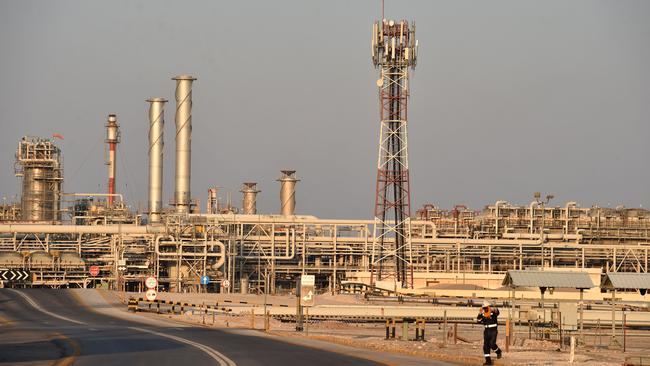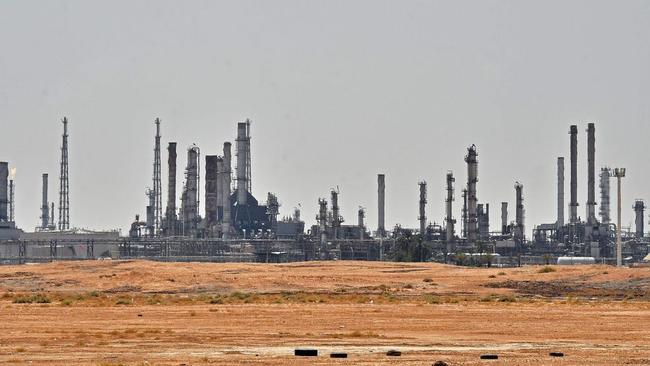Oil prices jump as OPEC+ cuts production by one million barrels a day
An OPEC+ decision to cut oil production by more than one million barrels a day poses a new threat to the global economy’s recovery.

Business
Don't miss out on the headlines from Business. Followed categories will be added to My News.
A shock decision by OPEC+ to cut oil production by more than a million barrels a day poses a new risk for the global economy at a time of added fragility after massive interest rate hikes.
In a statement, the Saudi energy ministry said the kingdom’s decision to further reduce its oil production was a precautionary measure aimed at supporting the stability of the oil market.
Crude oil futures surged as much as 8 per cent when Asia-Pacific trading began on Monday.
Brent crude oil futures were up 5 per cent at $US82.90 a barrel after rising as high as $US86.44.
The Australian sharemarket jumped to a more than three-week high as major energy producers including Woodside Energy and Santos initially rose more than 5 per cent.
The resulting pressure on oil prices comes at a bad time for the global economy. Even after the fastest interest rate hikes in decades, inflation is still considered far too high.
Most of the economic impact of rate hikes is yet to be felt, yet deposits have fled weaker banks in the US and Europe.
The crisis has claimed several US regional lenders including Silicon Valley Bank, while also forcing Credit Suisse to accept a merger with UBS.
The banking sector jitters are expected to tighten credit conditions, increasing economic risks.
“This will create both political waves across Europe and even higher general inflation in the US, leading to renewed pressure on the Federal Reserve to keep hiking rates aggressively,” ACY Securities chief economist Clifford Bennett said.
Equity markets had recovered in recent weeks as the banking crisis lowered interest rate expectations, but if crude oil prices continued to surge he saw a “worst case scenario” of re-accelerating inflation requiring more aggressive interest rate hikes.
“Given the already tight pricing across both manufacturing and services sectors, increases in the oil price quickly hit the gasoline pump prices and flow directly and fully into the costs of all services and products,” he said.
“There is no slack in pricing that could absorb another round of high oil prices.

“Neither the economy nor stocks are quite in the escape trajectory that many had begun to hope for in the past few weeks,” Mr Bennett said.
“While the upcoming US jobs data will be important to markets, the rise in the price of oil could well become the centrepiece of this week’s global markets board, impacting bond, equity and currency markets heavily.”
The S&P/ASX 200 index finished up 0.6 per cent at a more than three-week closing high of 7223 points after rising to 7246.1, led by the energy sector. The Aussie dollar hit a four-day low of $US66.51c.
US S&P 500 futures were down 0.3 per cent, with Nasdaq 100 futures down 0.7 per cent as US Treasury bond yields rose on inflation jitters. The two-year Treasury bond yield rose seven basis points to 4.13 per cent, while the benchmark 10-year yield rose 4 basis points to 3.53 per cent.
After Saudi Arabia’s announcement of a unilateral cut of 500,000 barrels a day from May until the end of 2023, Russia said it would extend a voluntary cut of 500,000 barrels a day until year’s end.
The United Arab Emirates, Kuwait, Iraq, Oman and Algeria said they would also cut output over the same time period, by a total of 581,000 barrels a day.
With the additional cuts pledged by Russia and some other countries, the new round of oil production cuts, on a “voluntary” basis, could exceed 1.65 million barrels a day, on top of production cuts of 2 million barrels a day announced in October.
“Today’s move, like the October cut, can be read as another clear signal that Saudi Arabia and its OPEC partners will seek to short-circuit further macro sell-offs and that Jay Powell is not the only central banker that matters,” said RBC head of commodity strategy Helima Croft.
Commonwealth Bank director of mining and energy commodities research Vivek Dhar said Sunday’s announcement was “particularly surprising”, given that as of last Friday there were reports that OPEC+ members were not expecting a change to oil production guidance.
At face value, the announcement means that the crude oil output of the OPEC+ cartel is set to fall by 1.1 million barrels a day, or about 1.1 per cent of global supply, from next month.
“Adherence to these output cuts will ultimately determine the market impact,” Mr Dhar said.
“Notably, the five largest OPEC+ oil producers – Saudi Arabia, Russia, Iraq, UAE and Kuwait – are participating in the production cuts. The selected involvement of the largest OPEC+ members suggests that adherence to production cuts may be stronger than has been the case in the past.”
The last major change to OPEC+ output was in October last year, when the cartel cut output by about 2 million barrels a day versus its August production levels, until the end of 2023.
The fresh round of cuts was thought to be prompted by the fall in prices during the recent crisis of confidence among US regional banks and some European banks last month.
“With Brent oil futures bottoming at $US73 a barrel last month, it stands to reason that OPEC+ may be willing to defend a floor of $US75 a barrel,” Mr Dhar said.
He said there were also “wider implications to consider” from a geopolitical perspective as the market for global oil and fuels needed to adjust to the EU sanctions on Russian oil and refined products.
The EU is expected to need to import more oil and refined products from the Middle East
“The ability of Western sanctions to penalise Russia but keep enough oil in the global market is facing risks if Russia and the Middle East are setting oil production policy together,” Mr Dhar said.
Originally published as Oil prices jump as OPEC+ cuts production by one million barrels a day



